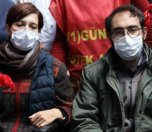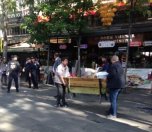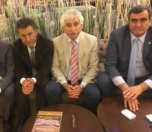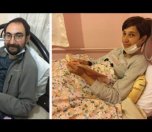Click to read the article in Turkish / Kurdish
Police attacked the supporters of academic Nuriye Gülmen and Semih Özakça who went on a hunger strike to be reinstated to their positions at 12 p.m. in front of the Human Rights Monument in Ankara today (May 22) on the 75th day of the hunger strike.
Açlık grevinin 75. gününde Gülmen ve Özakça'nın gözaltına alınmasının ardından Yüksel Caddesi'ne gelen yurttaşlara polis müdahale etti pic.twitter.com/mecA5T0D0U
— dihaber (@dihaberturkce) 22 Mayıs 2017
Seven people including Veli Saçılık who was discharged from public service through a statutory decree as well were taken into custody.
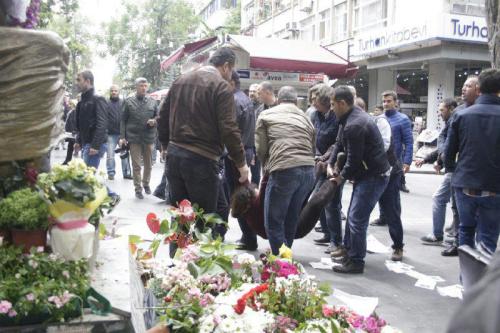
Seizing all the property in the hunger strike area including the flowers and benches, riot police have closed the street to pedestrian traffic.
CLICK - NURİYE GÜLMEN, SEMİH ÖZAKÇA ON HUNGER STRIKE DETAINED
"Hunger strikers lie on the ground in the cell"
Special operation forces raided homes of academic Nuriye Gülmen and teacher Semih Özakça, who were discharged through a statutory decree and have been on hunger strike for 75 days requesting to be reinstated to their jobs.
They are still on hunger strike.
Attorney Engin Gökoğlu talking to bianet said that Gülmen and Özakça following a medical examination in Ulus Hospital were taken to the Anti-Terror Department and were both being kept in cells.
"They have been on hunger strike for 75 days and now they have to lie on the ground in a cell. The authorities are responsible of their health situation".
Attorneys and Esra Özakça released
Stating that there are detention warrants for Gülmen and Özakça, police entered home breaking through the steel door of the home at around 1:00 a.m. today (May 22).
Besides, Semih Özakça's spouse Esra Özakça and attorneys Ayşegül Çağatay and Ebru Timtik were detained in the raid as well.
Esra Özakça as well as the attorneys Çağatay and Timtik were released today in the noon hours after legal action has been taken against them on charge of "resisting a police officer".
Gülmen and Özakça had started their protest 195 days ago and their hunger strike 75 days ago. It has been the seventh time the police have attacked the protest.
Detention in Küçük Armutlu
Aysel Doğan, mother of Dilek Doğan, who was shot to death at her home by police in an operation in Küçük Armutlu district of İstanbul as well as Nuray Gedik, the mother and Mustafa Meray grandfather of Hasan Ferit Gedik, who was shot to death in Gülsuyu, had gone on a hunger strike in solidarity with Gülmen and Özakça.
People's Law Office has informed that Doğan, Gedik and Meray were also taken into custody today in Armutlu Köyiçi Square. (AS/DG)






